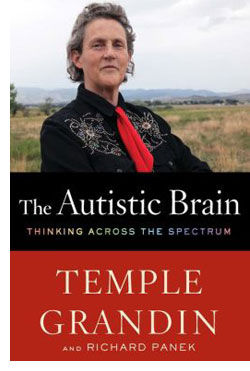 |
 |
 Temple Grandin and Richard Panek
Temple Grandin and Richard Panek
The Autistic Brain: Thinking Across the Spectrum
Houghton Mifflin Harcourt
US Hardcover First Edition
ISBN 978-0-547-63645-0
Publication Date: 05-30-2013
244 Pages; $28.00
Date Reviewed: 10-05-2013
Reviewed by: Rick Kleffel © 2013
Index:
Non-Fiction
The paradox is evident from the beginning. Temple Grandin, knowing she cannot trust her own senses, trusts her own ability to report them. It's the classic conundrum of a scientist forced to study herself so that those who share her condition have a better chance of transcending it. With 'The Autistic Brain: Thinking Across the Spectrum,' Temple Grandin enters the brave new world of neuroscience, takes to the tools and gets to work. It's an amazingly gratifying experience to read about.
Grandin's book is short, sharp and always to the point. It's divided into two sections; "The Autistic Brain" and "Re-Thinking the Autistic Brain." She offers readers a pocket history of her life and of our understanding of the diagnosis of autism. Considering herself lucky because she was born just after the first diagnosis was made, Grandin strikes out to explain why this is so, and ultimately, how this can help those diagnosed with autism now, in an age when our understanding of the mind is advancing on an almost weekly basis. Her history of the DSM — the manual used to diagnose mental illness — is particularly informative and rather damning. But she does not linger on the damage or controversy. Her history looks forward, not backward.
The joy for readers is Grandin's wide-eyed prose, her approach to the science. Early on, she likens the current science of genetics to a flash drive, sent back in time 100 years. The scientists studying that flash drive would be able to take it apart, name the parts, but they'd have no idea how it works. Then: "For a scientist, that lack of knowledge is thrilling. A new field to explore!"
Grandin's enthusiasm for new technology leads her to every MRI out there, and she's under the scanner, on the cutting edge before these new knives even have an acronym. She's an avid self-experimenter, and the book has more scans of her own brain than readers might have any reason to expect. She writes well as she describes the various sensory problems experienced by those "in the spectrum," acknowledging her own original mistaken inclination to think that everyone saw the world the way she did.
There's no shortage of technical and medical jargon and explanation in 'The Autistic Brain.' It's generally quite easy to read, enough so that it does get read rather than skimmed. She spends quite a bit of time with Asperger's syndrome, and does a great job at helping readers corral in all the subtle variations, to understand just what the spectrum is. With that understanding, Grandin moves to the next step, to suggest ways to help those on the spectrum, those who live in another world, get along in ours. She's a big fan of learning and minding one's manners, and her case for that is solid, but fun.
To a degree, it's easy to think that 'The Autistic Brain' is the book that Grandin has been working towards for years, and there'd be quite a bit of truth in that concept. But what sets Grandin's book apart from the flood of books on brain science is the author's voice. Yes, that voice is the presumably result of her condition, but it's a powerful and entertaining means of entry into an alternate world. Ultimately, 'The Autistic Brain' makes the case that Grandin does live in a sort of alternate reality. But her message from that world to ours could not be more clear or important. We do not just make up our minds; we make our minds, one day, one decision at a time.
|
 |
|
|
 |
| |
Review Archive
All Reviews alphabetized by author.
General Fiction
Non-Genre, general fiction and literature.
Horror
Supernatural fiction, supernatural horror and non-supernatural horror.
Science Fiction
Science fiction, science fantasy, speculative fiction, alternate history.
Fantasy
Fantasy, surrealism and magic realism.
Mystery
Crime, thrillers, mystery, suspense.
Non-Fiction
Non-Fiction, True Crime, Forteana, Reference.
Poetry
|
|
 |
|




